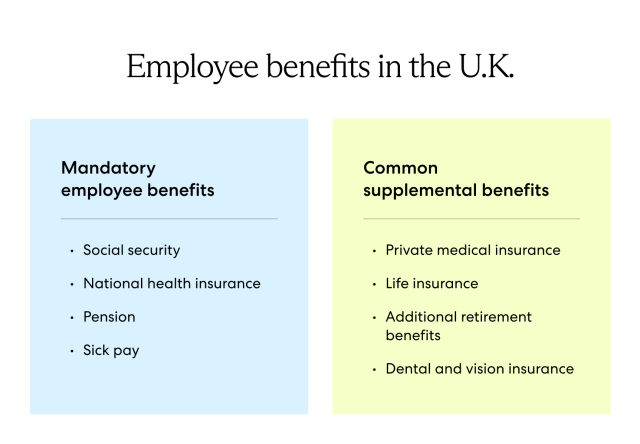The U.K. is a top location for companies seeking to hire abroad. Home to many of the world’s leading tech startups and financial investment companies, the U.K. has a diverse and skilled workforce and is one of the easiest countries to do business.
Companies hiring in the U.K. must comply with local employment laws, which include providing mandatory employee benefits. At the same time, they must also understand the common supplemental benefits that U.K. employees expect to receive from their employers.
The following guide discusses mandatory and common supplemental employee benefits in the U.K. and how to offer them to stay compliant and attract top talent.
What benefits do U.K. employees get?
Mandatory employee benefits in the U.K. include social security, health insurance, pension, and sick pay. U.K. employers may also provide supplemental benefits like additional paid time off, additional retirement benefits, private medical insurance, dental and vision coverage, and life insurance.

Mandatory employee benefits in the U.K.
U.K. employment law entitles employees in the U.K. to several statutory benefits. Mandatory employee benefits in the U.K. include the following:
Social security
U.K. employers and employees must contribute to social security under the National Insurance Scheme. National Insurance Contributions (NICs) fund government benefits programs that provide financial support to individuals who are unemployed, ill, retired, or on parental or bereavement leave.
Employer and employee deductions depend on several criteria, including the employee's insurance category and earnings. Most employers contribute 13.8% of the employee’s earnings, and most employees pay a 12% tax on their weekly earnings between £242 and £967 and 2% on weekly earnings above £967.
National health insurance
The U.K. offers free medical care to all citizens and qualifying residents under the National Health Service (NHS) universal healthcare system.
The NHS covers medical services like preventative care, surgical procedures, ambulance rides, emergency room visits, pre-existing conditions, and ongoing treatment programs. The NHS also subsidizes additional healthcare items, such as prescription medications.
While the NHS standardizes healthcare costs in the U.K., the system varies in each region. England, Northern Ireland, Scotland, and Wales each have their own NHS healthcare system, so employers must learn the local requirements depending on their workforce's locations.
Read also: 8 Countries With the Best Healthcare for Employees
Pension
U.K. employers must contribute to a workplace pension scheme. Employers enroll all eligible employees in the pension, which includes employees aged 22 and older who work in the U.K. and earn at least £10,000 per year.
Both the employer and employee contribute to the retirement, with employers contributing at least 3% and the employee contributing 5%. The contribution rates may vary depending on the employer’s chosen pension scheme.
Individuals become eligible to receive their state pension at age 65, but there is no mandatory retirement age in the U.K.
Learn more: Complete Guide to Payroll Tax in the U.K.
Sick pay
U.K. employees are entitled to 28 weeks of statutory sick pay at £109.40 per week. To qualify for statutory sick pay, employees must earn an average of at least £123 per week and have been ill for at least four consecutive days.
The employer covers the payment, which is subject to income tax and national insurance contributions. U.K. employees must also provide a physician’s sick note for all illnesses lasting longer than seven consecutive days.
Mandatory leave in the U.K.
U.K. employers must offer their employees leave for time off each year. Mandatory paid leave in the U.K. includes annual leave, holidays, and maternity leave and paternity leave.
Annual and holiday leave
Statutory annual and holiday leave regulations in the U.K. entitle employees who work a five-day week to 28 days of paid leave annually.
Though not required, U.K. employers also generally allow their employees to take paid time off during the following eight national holidays:
- New Year’s Day
- Good Friday
- Easter Monday
- Early May Bank holiday
- Spring Bank holiday
- Summer Bank holiday
- Christmas Day
- Boxing Day
Maternity and paternity leave
Pregnant employees in the U.K. are entitled to 39 weeks of statutory paid maternity leave at 90% of their average weekly earnings for the first six weeks and either £172.48 per week or 90% of their average weekly earnings for the remaining time, whichever is lower.
Fathers may take two weeks of paid paternity leave at £172.48 per week or 90% of their average weekly earnings, whichever is lower.
Employees in the U.K. may also take 18 weeks of unpaid parental leave up to the child’s 18th birthday, typically with a limit of four weeks per year. See how this compares with maternity leave in other countries.
Common employee benefits in the U.K.
In addition to statutory benefits, many companies hiring employees in the U.K. provide supplemental benefits to stay competitive and attract and retain talent. Below are several common supplemental employee benefits U.K. employers offer employees.
Private medical insurance (PMI)
Employers often offer private medical insurance (PMI) to cover medical needs not covered by the NHS healthcare system. The private healthcare market coverage may include inpatient, outpatient, wellness, dental, and vision benefits.
Additional paid time off
U.K. employers may provide their employees extra paid leave days beyond the statutory annual leave requirement. Many employers may also offer employees the option to increase their holiday entitlement and purchase extra leave days in their benefits package.
Additional retirement benefits
Employers may contribute more to their employees’ pension funds. Employers must contribute 3% but may choose to match an employee’s contribution of up to 5%.
Dental and vision insurance
The NHS provides subsidized dental care coverage, and individuals must pay contributions toward the cost. The NHS also provides free eye tests, but individuals typically pay for vision services such as eye exams and glasses prescriptions.
To help cover these costs that the NHS doesn’t subsidize, employers may include additional dental and vision insurance as a supplemental benefit in their employment compensation packages.
Life insurance
U.K. employers may include life assurance policies in their supplemental benefits plans. Under this insurance, the employer pays the employee’s beneficiaries if the employee dies while working for the company.
Additional perks to attract top talent in the U.K.
While the U.K. entitles employees to many statutory benefits, employers should provide additional fringe benefits or perks to attract and retain talent. Below are some common perks employers in the U.K. offer their employees:
- Company car. Employers might provide employees with a company vehicle, car allowance, or fuel reimbursement. This fringe benefit is beneficial in a work environment where employees travel frequently.
- Flexible working hours. Many employers implement flexible work policies, such as remote or asynchronous work. Flexible working hours give employees more control over their work-life balance and allow them to work when they are most productive.
- Sabbatical leave. In addition to statutory leave, employers may allow employees to take extended paid or unpaid time away from work to pursue personal interests. Allowing employees to take sabbatical leave improves company morale and productivity because employees are more likely to return to work refreshed and motivated.
- Meal vouchers. A company might offer meal vouchers to employees for client meetings or to help offset the cost of living. Offering meal vouchers may improve employee morale, health, and productivity.
- Wellness funds. Employers may provide an allowance for health and wellness-related expenses, such as gym memberships. Wellness funds allow employees to improve their well-being, resulting in higher job satisfaction and productivity.
- Bonuses. Employers often offer supplemental pay like bonuses to celebrate employees’ professional achievements or celebrate company success. Bonuses help motivate employees and boost morale and engagement.
Provide compliant employee benefits in the U.K. with Velocity Global
Administering benefits to a global workforce presents many challenges, from navigating unfamiliar statutory laws to ensuring your benefits packages stand up to the competition. However, working with a partner like Velocity Global can simplify the process.
Our Global Benefits solution helps companies provide competitive employee benefits in the U.K. that exceed the minimum requirements. Our team of experts craft market-specific, comprehensive global employee benefits packages that comply with local statutory laws and help you stand out from the competition to grow and retain top talent in the U.K.
Ready to build and support a top-tier team in the U.K. with competitive benefits packages? Contact Velocity Global to get started.
Disclaimer: The intent of this document is solely to provide general and preliminary information for private use. Do not rely on it as an alternative to legal, financial, taxation, or accountancy advice from an appropriately qualified professional. © 2023 Velocity Global, LLC. All rights reserved.
Topic:
Employee Benefits



